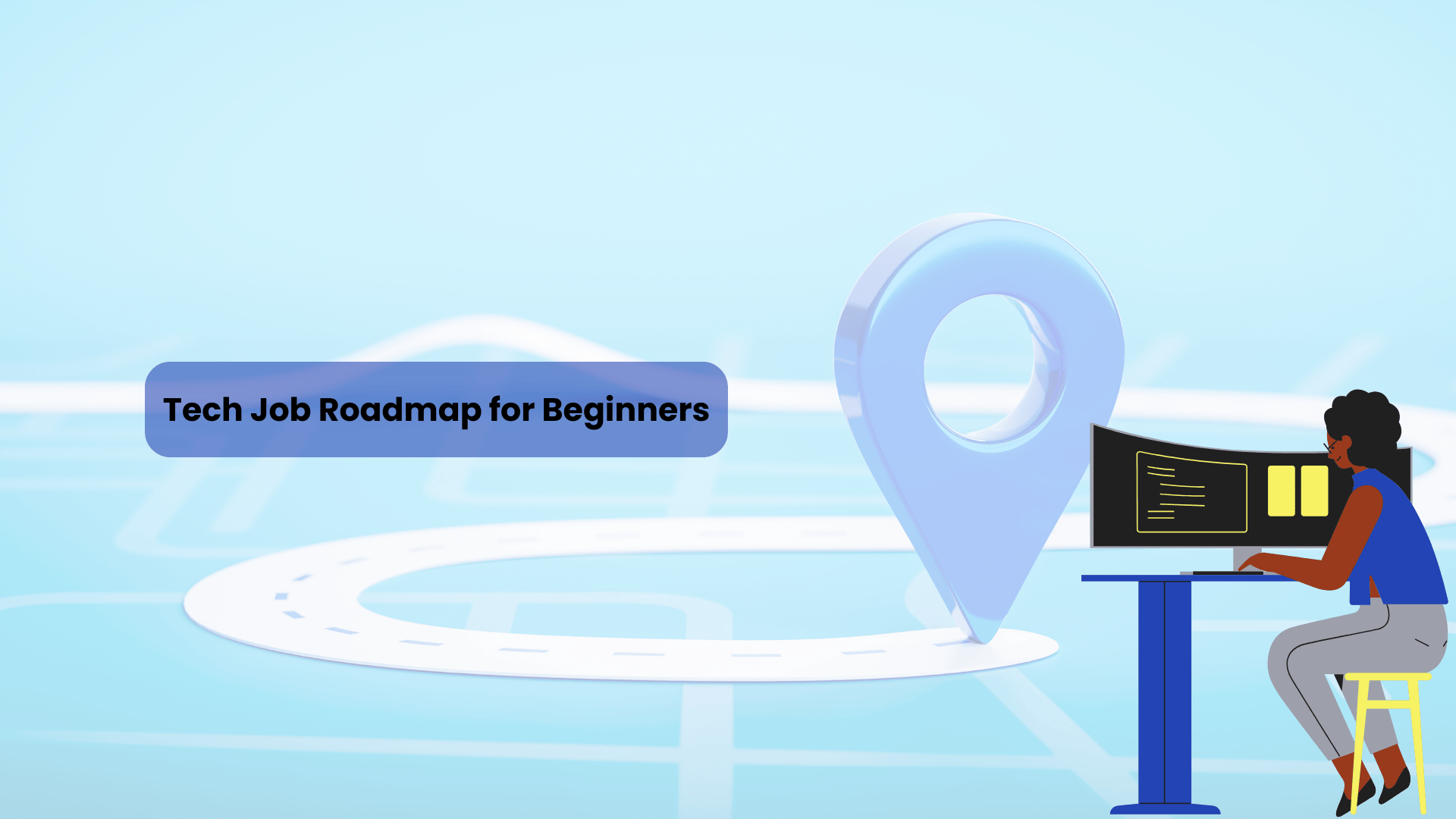Introduction: Starting Your Career in Tech
The tech industry is one of the fastest-growing sectors globally, with endless opportunities for growth, innovation, and career development. It can seem overwhelming if you’re a beginner looking to break into the world of tech. How do you know where to start with so many different paths, roles, and skills to consider?
This article will provide a clear roadmap for beginners pursuing a tech career. Whether you’re looking to become a software developer, data scientist, or IT professional, this guide will break down the essential steps to help you get started and succeed in the tech world.
Why Tech Jobs?
Before diving into the roadmap, let’s first take a moment to explore why tech jobs are so appealing:
- High Demand: As businesses increasingly rely on technology, the demand for skilled professionals rises. According to recent statistics, tech jobs are growing faster than most other sectors.
- Good Salaries: Many tech jobs offer competitive salaries, with roles such as software engineering and data analysis boasting six-figure incomes.
- Career Flexibility: The tech industry is incredibly diverse, offering a variety of roles that range from hands-on technical positions to managerial roles in areas like product development, marketing, and project management.
Step 1: Identify Your Interests and Goals
The first step in your tech journey is identifying what area of tech excites you the most. The tech world is vast, so narrowing down your options based on your interests and long-term career goals is essential. Here are some standard tech job categories to consider:
Software Development
If you love problem-solving and coding, software development could be your right path. This field focuses on creating applications, websites, and systems.
Data Science and Analytics
For those who enjoy working with data, statistical analysis, and machine learning, data science is a fast-growing field that offers lucrative opportunities.
Cybersecurity
With the rise in cyber threats, cybersecurity professionals are more in demand than ever. This might be your path if you’re detail-oriented and enjoy protecting data and systems.
IT Support and System Administration
If you enjoy helping others with tech issues and managing networks and systems, IT support or system administration could be your ideal job.
Product Management
Product managers oversee the development and lifecycle of a product, collaborating with various teams. This could be a great fit if you’re good at strategy, communication, and leadership.
Web Development and UX/UI Design
If you have a creative side and enjoy designing and building websites or applications, web development and UX/UI design could be your perfect tech path.
Step 2: Learn the Required Skills
Once you’ve decided which area of tech interests you, the next step is to start learning the necessary skills; while a formal computer science or engineering degree is one way to go, it’s not the only path. Many tech professionals are self-taught or have attended coding boot camps.
Online Learning Resources
There are countless free and paid online resources available. Here are a few popular ones:
- FreeCodeCamp: Learn web development, coding, and more with free courses.
- Coursera: Offers courses in computer science, data science, and other tech fields, often from top universities.
- Udemy: An affordable platform with courses on virtually every tech topic, from coding to product management.
Coding Bootcamps
If you prefer structured learning, coding boot camps can fast-track your journey. They typically focus on practical skills and prepare you for specific roles like web development, data analysis, or cybersecurity. Some well-known boot camps include:
- General Assembly
- Le Wagon
- Flatiron School
These boot camps can be a great option if you’re looking for a career switch and want to jump into tech quickly.
Certifications
Some fields in tech, like cybersecurity and cloud computing, require specialized certifications. For example:
- CompTIA A+ for IT support
- AWS Certified Solutions Architect for cloud computing
- Certified Information Systems Security Professional (CISSP) for cybersecurity
Step 3: Build Practical Experience
While learning the theory behind your chosen tech field is essential, hands-on experience is equally crucial. There are several ways to gain real-world experience before landing your first job:
Personal Projects
Working on your projects is one of the best ways to apply your learning. For example:
- Software Development: Build a website or mobile app to demonstrate your coding skills.
- Data Science: Work with open datasets to create analyses and visualizations.
- Cybersecurity: Set up a home lab to practice penetration testing and network security.
These projects help you learn and make your portfolio more impressive to potential employers.
Internships and Freelancing
Internships are a great way to get your foot in the door. Many companies offer internships for entry-level candidates, and some even offer remote positions. You can also freelance through platforms like Upwork, Freelancer, and Fiverr to gain practical experience and build a portfolio.
Contribute to Open Source
If you’re in software or web development, contributing to open-source projects is an excellent way to gain exposure and showcase your abilities. Websites like GitHub are full of open-source projects that need contributors. Collaborating with others will help you improve your skills and build a strong professional network.
Step 4: Networking and Building Your Brand
In the tech industry, networking can be as important as technical skills. Building a professional network will help you find job opportunities, learn from experienced professionals, and get advice on navigating your career.
LinkedIn is an essential tool for tech professionals. Make sure to create a well-optimized LinkedIn profile with the following:
- A professional photo
- A clear summary of your skills and goals
- Any relevant projects or internships
Tech Meetups and Conferences
Many cities have tech meetups where you can connect with professionals in your area. Conferences, hackathons, and webinars are great places to learn and network.
Online Communities
Joining online communities such as Reddit’s tech subreddits or Slack groups can also help you stay up-to-date on industry trends and job openings.
Step 5: Apply for Jobs and Prepare for Interviews
Once you’ve built your skills and gained experience, it’s time to apply for jobs. Tailor your resume to each position and highlight your relevant knowledge and skills. Here’s how to prepare for the job search:
Create a Strong Portfolio
Your portfolio is often the first impression you make on hiring managers. Make sure it showcases your best work. If you’re a developer, this could include code you’ve written, apps you’ve built, or websites you’ve designed.
Prepare for Technical Interviews
Tech interviews can be tough, so preparing and practicing coding challenges on platforms like LeetCode, HackerRank, or Codewars is essential. Be ready to answer questions about algorithms, problem-solving, and system design.
Soft Skills Matter
Tech jobs aren’t just about coding. Soft skills like communication, teamwork, and problem-solving are crucial. Prepare for behavioral interview questions that assess these qualities.
Step 6: Never Stop Learning
The tech industry evolves rapidly, so you need to continue learning to stay competitive. Stay updated on your chosen field’s latest technologies, trends, and certifications.
Conclusion: Starting Your Journey in Tech
Breaking into tech as a beginner is a challenging yet enriching journey. By identifying your interests, learning the necessary skills, gaining practical experience, and building your network, you’ll be well on your way to securing a job in the tech industry. The key is persistence, learning, growing, and embracing new opportunities.
FAQs
- How long does it take to get a tech job as a beginner?
- Depending on your learning pace and the field, it can take anywhere from 6 months to 2 years to land your first job in tech.
- Do I need a degree to get a tech job?
- While a degree can be helpful, many successful tech professionals are self-taught or have attended coding boot camps.
- What is the best tech job for beginners?
- Roles like web development, IT support, and data analysis are great entry points for beginners.
- How can I improve my chances of getting hired in tech?
- Build a solid portfolio, network with industry professionals, and continuously improve your skills through certifications and projects.
- What are the highest-paying tech jobs for beginners?
- Some of the highest-paying entry-level tech jobs include software developer, data scientist, and cloud computing specialist.
Please don’t forget to leave a review.

